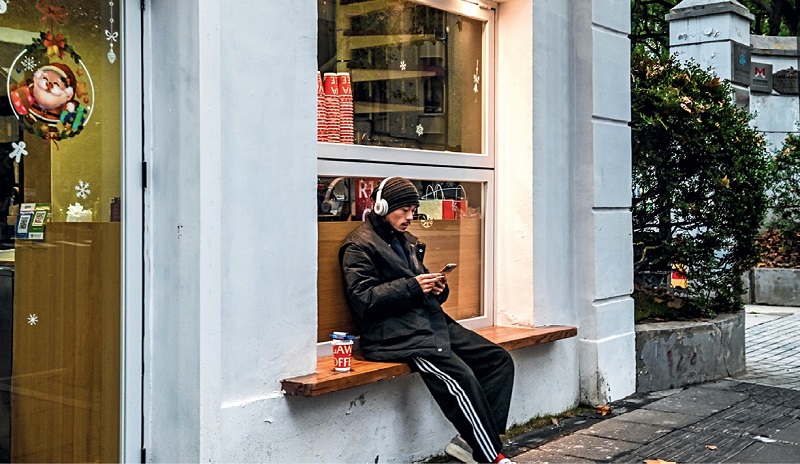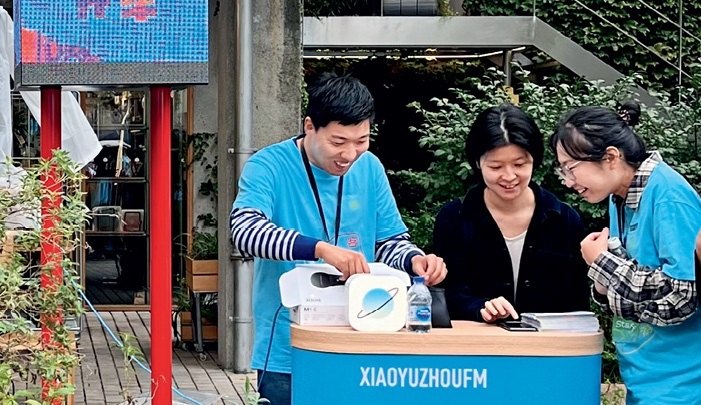Podcasts offer diverse content spanning education, entertainment, news, business, sports, and much more, catering precisely to users’ personalized interests.

A young man wearing headphones sits on the windowsill outside a bakery on Taiyuan Road, in Xuhui District, Shanghai, on December 7, 2022.
In the fast-paced modern world, people rush through their days as time fractures into fragmented moments, their eyes glued to screens of all sizes. Against this visual information overload, users seeking professional but more relaxing ways of getting informed are increasingly turning to auditory experiences. Thus, listening to podcasts is emerging as a popular new choice for many in China.
A smart phone and a set of headphones are all you need. This listening flexibility creates more usage scenarios: whether on crowded subways, during long commutes, doing household chores or working out – more and more people are donning headphones to fill these fragmented pockets of time with audio content. Once a niche hobby, podcasting has rapidly evolved into a cultural phenomenon.
Data from the 2024 Chinese Podcast Industry Report by Just Pod, one of China’s leading podcast and digital audio firms, reveals that the number of Chinese podcast listeners reached 117 million in 2023, with projections soaring to 179 million by 2027. Its audience profile shows that listeners are predominantly young adults in big cities – curious, open-minded, and well-educated. They demand high-quality content, exhibit rational consumption habits, and prioritize physical and mental well-being.
Intimate Companionship
“I’m fed up with algorithm-driven short videos and rapid social media updates – they make me feel exhausted, both mentally and physically, with eyes strained from constant screen time. Compared to fragmented clips, podcasts allow listeners to fully perceive the nuances of any given topic. It helps me grasp topics I care about more comprehensively and in detail, and I’ve learned a lot,” said Yang Hengbao, 35, who works in the fintech industry and frequently listens to tech and business podcasts during his daily drive to work.
In his opinion, unlike short videos that prioritize brevity, podcasts offer a deep, immersive experience. They engage listeners through conversations spanning minutes or even hours, delivering thoughtful insights and rich information.
For 56-year-old retiree Lu Ya, podcasts provide a unique sense of companionship. “A great podcast makes you feel accompanied, immersing you so deeply that it’s almost tangible. Some music podcasts feel like a music salon – the host seems to be sitting on the couch beside me, sharing their perspectives on music. Their words come through so clearly that I can almost see their expressions. This intimacy is something many listeners like me who’ve tuned in alone at night would deeply relate to.”
On Chinese social media, a growing number of young people describe podcasts on workplace anxieties, relationship dilemmas, and life choices as an “invisible friend” – one that quietly supports them through life’s challenges.
Another 2024 industry report about podcast by Ximalaya and other organizations unveils that 76.2 percent of listeners engage with podcasts over 30 minutes every day.
In terms of creators, most of them are highly specialized and enthusiastic young professionals eager to share their expertise, with approximately 60 percent of the programs closely aligned with their primary occupations or fields of specialization.
Young artist Wang Damiao channels her creative energy into a podcast, “Art on the Go” (Yi Qi Kai Che). Her program is a commute-time conversation series between she and her partner, both co-founders of the spatial design lab Studionano. “We aim to share creative sparks from our artistic and entrepreneurial journeys, explore the blurred boundaries where art meets technology, and celebrate the seemingly trivial yet deeply human moments in everyday life,” Wang noted.
“Deciding on the angle to approach art topics often takes us hours of discussion,” Wang reflected. “Considering the preciousness of audiences’ attention span, we strive to keep each episode around 60 minutes. This means ruthless editing of our outlines. The recording process itself is full of twists – dead microphones interrupting flow, and exhausted retakes when background noise ruins a perfect moment, only to find the redo lacks spontaneity.” She added with determination, “Yet, every episode undergoes this meticulous polishing, since authentic connection with like-minded listeners through heartfelt dialogue makes it all worthwhile.”
To foster deeper connections with their audiences, creators are increasingly embracing offline engagements, transforming online interactions into intimate gatherings reminiscent of friends’ reunions.
On October 19, 2024, the top Chinese podcast app Xiaoyuzhou (Little Universe), which was launched in March 2020 and became popular quickly afterwards, pioneered its first large-scale offline event “2024·Podcast Odyssey Day” at Shanghai’s Columbia Circle, a vibrant community that integrates culture, entertainment, and daily life. This hybrid experience seamlessly integrated panel discussions, creator meet-and-greets, immersive exhibitions with interactive installations, and a curated marketplace. The landmark event attracted over 500 content creators, over 150 brand partners and over 60 media collaborators, totaling over 20,000 onsite attendees.
A Rednote user who went to the off-line venue commented on the activity on his homepage, “The podcasts that accompany us day and night are like planets, and we finally move from online to offline, wandering side by side with our own planet, creating echoes.”

Podcast listeners of Xiaoyuzhou FM enjoy meeting each other and chatting at the app’s event in Shanghai Columbia Circle on October 19, 2024.
Exploring Commercialization
Looking at the big picture, as revealed by iiMedia Research, China’s auditory economy surged 10.2 percent year-on-year in 2024, attaining a scale of RMB 568.82 billion, and is expected to exceed RMB 740 billion by 2029.
However, there’s still a long way to go for even creators with a big fan base to make a sustainable income. Eighty percent of creators work part-time, and despite a stable update frequency and significant engagement, they face commercialization challenges. Paid podcasts and podcast advertisements have become two clear commercialization paths, and some creators have tried and achieved certain success.
The 2024 podcast industry report by Ximalaya shows that among the surveyed users, 45.9 percent have purchased paid podcast programs in the past year, and 63.6 percent have a positive attitude towards podcast advertising.
“I’d pay RMB 6 for a special episode of my favorite music podcast as creating a single episode demands significant effort. Charging is reasonable, and spending RMB 6 for a meticulously crafted hour-long show feels worth it to me,” Lu Di told China Today.
The promising side is the industry’s commercial potential is increasingly evident, with brands tightening collaborations. According to Ximalaya data, nearly 100 brands partnered with podcast platforms in 2024, sponsoring close to 1,000 shows, seeing a 74 percent increase in brand investments and a 172 percent year-on-year rise in participating podcasts.
Besides, alongside paid episodes and ad placements, branded podcasts are emerging as a key monetization strategy in the industry. Under this model, brands craft tailored programs to narrate their stories in depth, fostering stronger connections with consumers.
Following the finale of its sixth season on Xiaoyuzhou, the podcast Yan Zhong Hua Shu, or GIADA Herstory, has elevated its influence among female audiences. The show, created by Italian luxury womenswear brand GIADA for mature, intellectually driven women, has gained endorsement of the renowned Chinese television host Lu Yu. Notably, GIADA bypassed traditional celebrity endorsements and ads. Instead, it launched the podcast program series, where the host engages in dialogues with pioneering Chinese women across various industries. After nearly three years of cultivation, the podcast has amassed over 1.07 million subscribers on Xiaoyuzhou, making it the largest branded podcast in the Chinese-speaking world.
Soothing yet substantive, this encapsulates listeners’ impression of the female-centric series. Each episode features Lu Yu and women from diverse fields, such as literature, film, art, and theater, sparking high-caliber discussions on mature femininity through the lens of cultural works like books, paintings, and plays.
The thoughtfully curated Herstory narratives collectively embody GIADA’s brand ethos of minimalism, modernity, and elegance. As articulated in the piano-accompanied opening of each episode: “We discuss art to find ourselves through dialogue. We discuss women, letting their voices and light transcend mediums to reach the soul.” Avoiding conventional advertising in China, the Milan luxury brand has rapidly entered mainstream vision via the program.
Though compared with short video platforms, the revenue of China’s podcast advertising market in 2024 was about RMB 3.3 billion as Statista’s report showed, which is a fraction of the annual advertising revenue of the former. But as the podcast audience continues to grow, creators like Wang believe that commercialization is accelerating.